How can we remove CO2from the atmosphere and actively contribute to climate protection in the process? How can we reduce our material consumption, recycle more materials and at the same time develop alternative raw materials? At Festo, we have been addressing these issues for some time and are breaking new ground: we are transferring our automation technology know-how to biological processes.
The cell as a factory
Living cells are the smallest factories in the world. The algae cells convert sunlight, carbon dioxide and water into oxygen and chemical energy carriers or organic recyclable materials by means of photosynthesis in their chloroplasts. Algae are small climate savers, as they bind ten times more CO2than land plants do. This value can be increased by a factor of ten through automated cultivation in bioreactors.
Optimized growth conditions through automation
With our automation technology, biomass can be cultivated in a closed cycle in a highly efficient, resource-saving manner and on a large scale. The biomass obtained can be used in the chemical, food or pharmaceutical industries. Thus, we present the BionicCellFactory as a tool for the biological transformation towards an environmentally sound circular economy.
The BionicCellFactory is divided into five modules in which nature and technology merge in different ways. Unlike chemical processes, we do not need high temperatures, high pressures and toxins.
The five modules of the cell factory
1. CO2 collection: Binding CO2 from the air
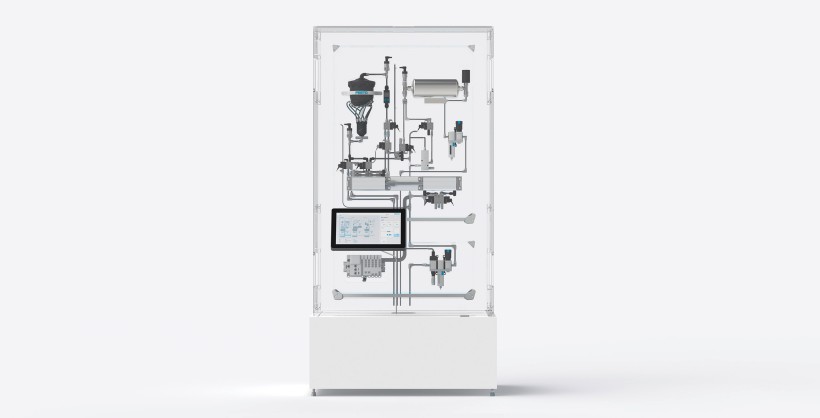
Algae grow best at a CO2 concentration of around two percent. However, since our ambient air contains far less than one percent, the CO2 collection module enriches the algae with a higher concentration: it filters the required gas from compressed air by introducing it into a chamber which has CO2-binding granulate blown into it.
The granulate consist of a polymer that, depending on the prevailing conditions, can absorb CO2and also release it. When the granulate has absorbed sufficient CO2it is heated to a temperature of 90 degrees Celsius to release the gas again. The concentrated CO2is finally cooled in an intermediate storage tank and blown into the bioreactor via a gassing element.
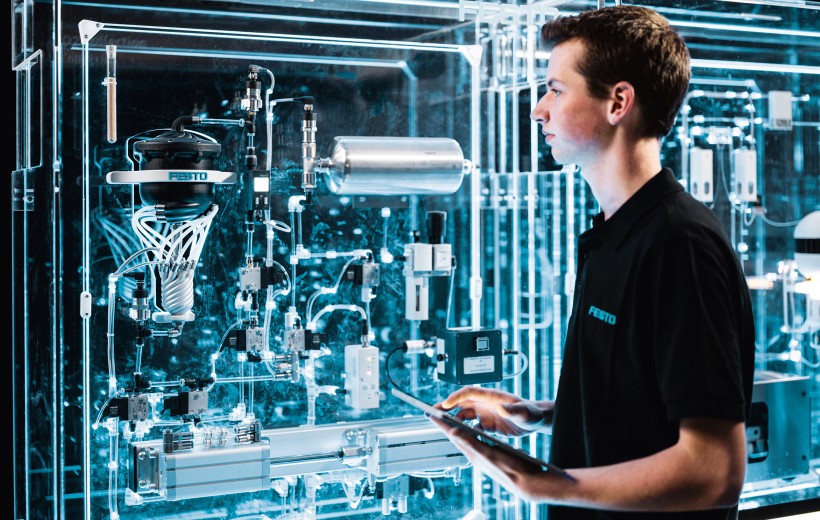
2. Analysis: Monitoring cells using quantum sensing and AI
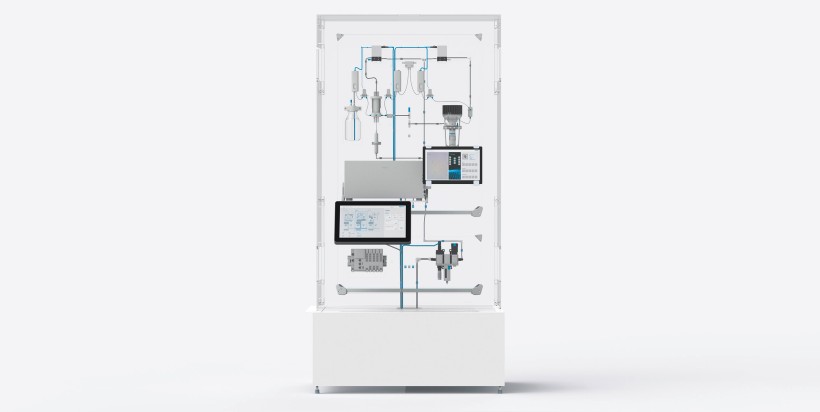
A major challenge with bioreactors is to accurately determine the amount of biomass. For this purpose, we use an optical method based on microscopy and AI, as well as quantum technology, in the analysis module. The digital microscope continuously delivers images that are evaluated by the AI. Through training images, it has learned to recognize the algae cells.
For the quantum-based particle sensor, a precision pump transports the algae cells out of the cultivation system. Using a precise valve system, they are fed to a mixing tank where they are diluted with water for optimal analysis conditions. The pressure-over-liquid principle enables a uniform flow velocity and directs the mixture to the quantum sensor.
The sensor – developed by start-up Q.ANT – provides huge amounts of data, which can consist of the size and number of algae, as well as foreign bodies. These analyses make it possible to react to process events in advance and to intervene in a regulating manner.
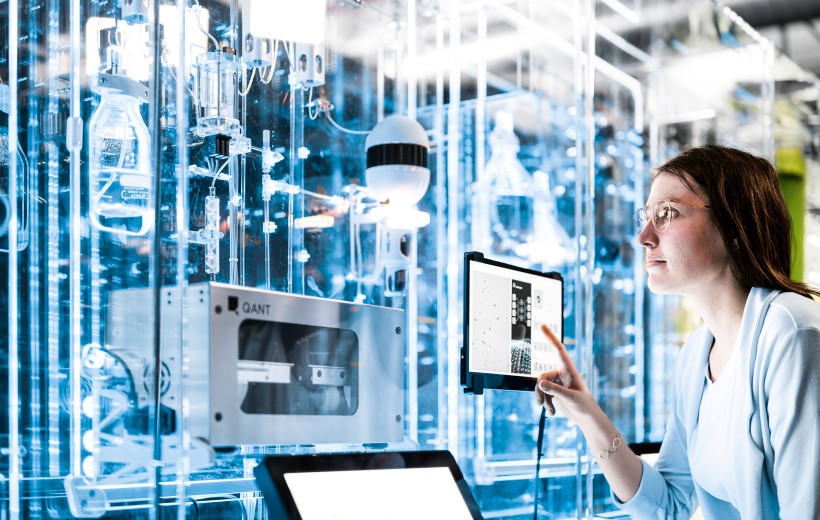
3. Cultivation: Controlled growth of biomass through automation
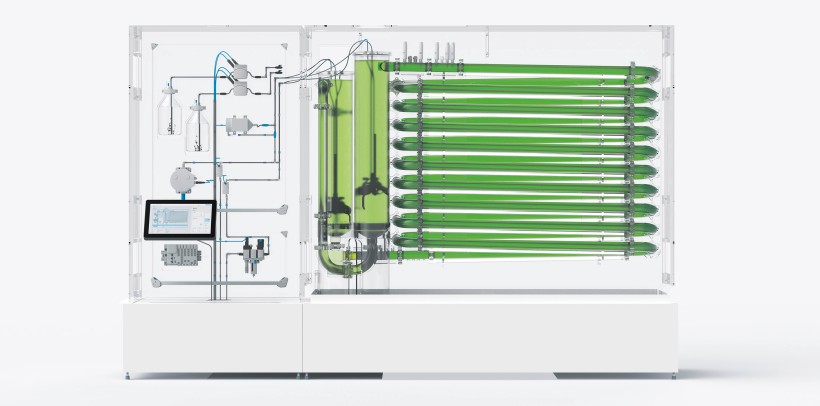
The heart of the BionicCellFactory is a 45-meter-long tube system from Algoliner with a capacity of 80 liters. In this transparent, illuminated photo section, the algae cells photosynthesize under optimal growth conditions. Sensors continuously measure conductivity, pH, oxygen and CO2 concentration as well as the temperature.
The system adds nutrients such as potassium, phosphorus and nitrogen depending on the needs of the algae. A heat exchanger ensures the correct temperature control. Mass flow control and innovative piezo valve technology enable precise metering of air. Up to 20 liters per minute are supplied via an aeration element. The resulting fine air bubbles ensure the optimum exchange of CO2and O2between algae and the environment.

4. Harvest: Harvesting of algae by means of centrifuge
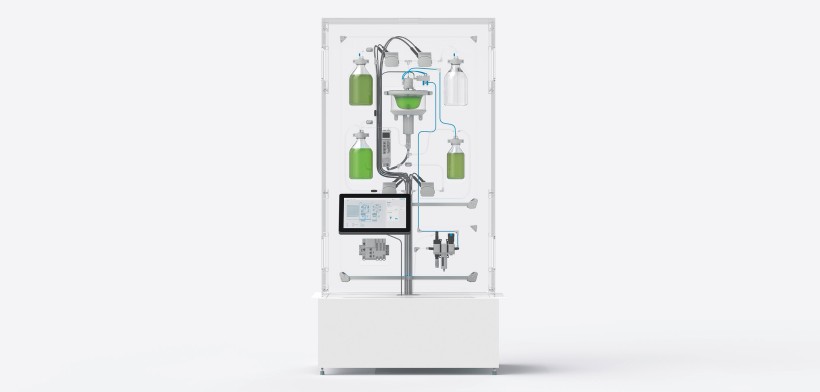
The Harvest module is the interface between cultivation and enzymatic transformation of the biologically grown material. A centrifuge ensures continuous harvesting of the biomass: at a speed of 10,000 rpm, the algae cells are separated from their aqueous environment and forced to the edge; the water is returned to the process.
Via a pump, the algae are finally transferred to the next module for further processing. The timing and amount of harvesting are regulated to keep the algae vitality at the optimal level and provide the appropriate amount of biomass for transformation in the next step.
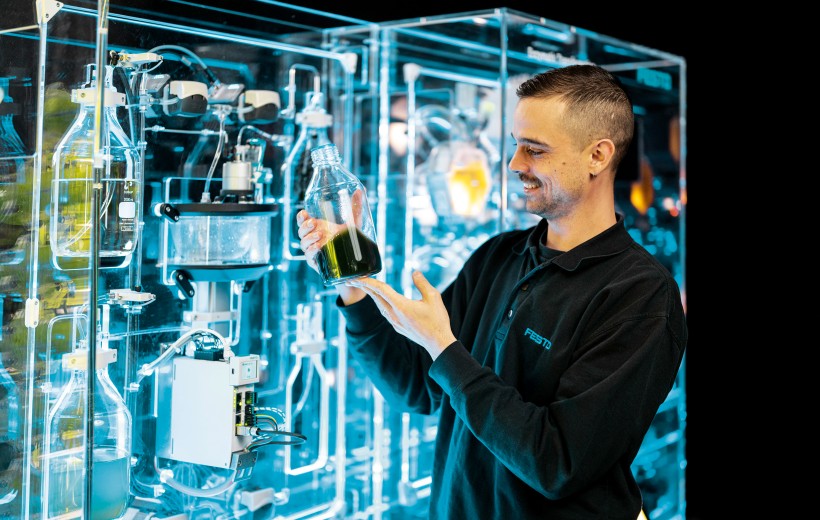
5. Enzymatic transformation: extraction and further processing of cell components

Five so-called transformation cubes with individual tasks create optimal conditions for the refinement of algae by enzymes. They are biological catalysts that are fed in a targeted manner. Thus, they support the gradual transformation, which does not require any heavy metals.
In order to finally extract individual components from the harvested algae, so-called enzyme shears cut open the cell walls and thus access the ingredients: starch, proteins, colorants, and the algae oil that we wanted in our case. Hardly any energy is required for this, because the environmentally friendly process runs at mild – automatically controlled – ambient conditions of 40 degrees Celsius and a pH value of five. The algae oil obtained can now be used as a food supplement and for the production of cosmetics, or further processed into energy sources or bioplastics. The algae residues can be used as feed or fertilizer.
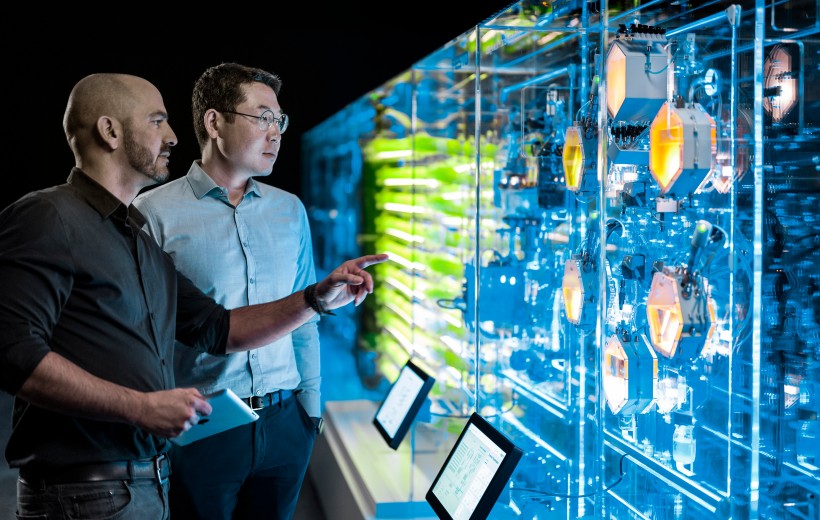
Control architecture
The modular design of the BionicCellFactory is also reflected in the control architecture: each module is controlled by a CPX-E controller from Festo. This means that the five process steps can be operated both in combination and separately, and can be easily exchanged in the event of production changes.
Via dashboards on the respective operating panel, the experts can monitor and change individual parameters of the process steps. Data exchange between the modules takes place via OPC UA and enables efficient control of the entire BionicCellFactory.
Production systems of the future
The BionicCellFactory as a model factory is the universal blueprint for holistic production systems of the future. With the help of our automation technology, it can be scaled to any size. Bioreactors with a capacity of several thousand liters are needed to meet the future demand for renewable raw materials. Expertise in process automation is required to ensure that the plants can reliably produce biomass on the desired scale.
We develop intelligent control cabinet solutions for bioreactors with our customers and continue to expand our portfolio. In process control, we ensure stable and precise process control with maximum productivity. These include optimized gassing and feeding strategies, control algorithms, soft sensors for biomass determination in real time, and system concepts for biobased production processes.
New areas of work for new technologies
Highly qualified technical personnel and biotechnologists are not available everywhere. To this end, our experts at Festo Didactic are already analyzing the new need for knowledge in order to define interdisciplinary links and establish innovative training professions, courses of study and additional qualifications in the fields of biomechatronics, biointelligence and sustainability.